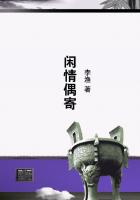Having accounted for our moral judgments of the actions of others by bringing them to the test of our power to sympathize with them, he proceeds to explain our moral judgments concerning our own acts by a sort of reflex application of the same principle of sympathy. Our sense of duty, our feeling of conscience, arises simply from the application to our own conduct of the judgments we have learned to pass upon others. So that there really exists no moral faculty which is not originally borrowed from without.
In the same manner as we approve or disapprove of another man's conduct, according as we feel that, when we bring his case home to ourselves, we can sympathize or not with his motives; so we approve or disapprove of our own conduct according as we feel that, by ****** our case in imagination another man's, he can sympathize or not with our motives. The only way by which we can form any judgment about our own sentiments and motives is by removing ourselves from our own natural station, and by viewing them at a certain distance from us; a proceeding only possible by endeavouring to view them with the eyes of other people, or as they are likely to view them. All our judgment, therefore, concerning ourselves must bear some secret reference either to what are or to what we think ought to be the judgment of others. We imagine ourselves the impartial spectator of our own conduct, and according as we, from that situation, enter or not into the motives which influenced us, do we approve or condemn ourselves.
We do not therefore start with a moral consciousness by which we learn to judge of others, but from our judgments about others we come to have a moral consciousness of our- selves. Our first moral criticisms are exercised upon the characters and conduct of other people, and by observing that these command either our praise or blame, and that we our- selves affect them in the same way, we become anxious in turn to receive their praise and to avoid their censure. So we imagine what effect our own conduct would have upon us, were we our own impartial spectators, such a method being the only looking-glass by which we can scrutinize, with the eyes of other people, the propriety of our own conduct.
Accordingly our sense of personal morality is exactly analogous to our sense of personal beauty. Our first ideas of beauty and ugliness are derived from the appearance of others, not from our own. But as we are aware that other people exercise upon us the same criticism we exercise upon them, we become desirous to know how far our figure deserves their blame or approbation.
So we endeavour by the help of a looking-glass to view ourselves at the distance and with the eyes of other people, and are pleased or displeased with the result, according as we feel they will be affected by our appearance.
But it is evident that we are only anxious about our own beauty or ugliness on account of its effect upon others; and that, bad we no connexion with society, we should be altogether indifferent about either. So it is with morality. If a human creature could grow up to manhood in some solitary place, without any communication with his own kind, "he could no more think of his own character, of the propriety or demerit of his own sentiments, of the beauty or deformity of his own mind, than of the beauty or deformity of his own face." Society is the mirror by which he is enabled to see all these qualities in himself. In the countenance and behaviour of those he lives with, which always mark when they enter into or disapprove of his sentiments, he first views the propriety or impropriety of his own passions, and the beauty or depravity of his own mind.
The consciousness of merit, the feeling of self-approbation, admits therefore of easy explanation. Virtue is amiable and meritorious, by reference to the sentiments of other men, by reason of its exciting certain sentiments in them; and the consciousness that it is the object of their favourable regards is the source of that inward tranquillity and self-satisfaction which attends it, just as the sense of incurring opposite sentiments is the source of the torments of vice. If we have done a generous action from proper motives, and survey it in the light in which the indifferent spectator will survey it, we applaud ourselves by sympathy with the approbation of this supposed impartial judge, whilst, by a reflex sympathy with the gratitude paid to ourselves, we are conscious of having behaved meritoriously, of having made ourselves worthy of the most favourable regards of our fellow-men.
Remorse, on the other hand, arises from the opposite sentiments; and shame is due to the reflection of the sentiments our conduct will raise in other men. We again regard our- selves from their point of view, and so by sympathizing with the hatred which they must entertain for our conduct, we become the object of our own blame and hatred. We enter into the resentment naturally excited by our own acts, and anticipate with fear the punishment by which such resentment may express itself. This remorse is, of all the sentiments which can enter the human breast, the most dreadful; "it is made up of shame from the sense of the impropriety of past conduct; of grief for the effects of it; of pity for those who suffer by it; and of the dread and terror of punishment from the consciousness of the justly provoked resentment of all rational creatures."In this consciousness of the accordance or discordance of our conduct with the feelings of others consists then all the pleasure of a good conscience or of self-approbation, or all the pain of remorse or self-condemnation.
The one is based on our love of praise, which the comparison of our own conduct with that of others naturally evolves in us, and the other on our aversion to blame, which arises in the same way.













